Hero #133: Thich Nhat Hanh … (01/21/16)
Born in 1926, Hanh (known affectionately by many of his friends & followers as “Thay”) is a Vietnamese Zen Buddhist monk, teacher, author, poet and peace activist. He lives in the Plum Village Monastery in the Dordogne region of southern France.
By the late 1950’s, when he was already a Buddhist monk of no small fame, Thay founded Lá Bối Press, the Van Hanh Buddhist University in Saigon, and the School of Youth for Social Service — a neutral corps of Buddhist peaceworkers who journeyed into rural areas to establish schools, build healthcare clinics, and help re-build villages. In 1960, Nhat Hanh went to the U.S. to study comparative religion at Princeton University, and subsequently lectured in Buddhism at Columbia University. By then he had gained fluency in French, Chinese, Sanskrit, Pali, Japanese and English, in addition to his native Vietnamese. In 1963, Thay returned to Vietnam to aid his fellow monks in their non-violent peace efforts. At a meeting Van Hanh Buddhist University meeting in April 1965, students issued a Call for Peace statement, declaring: “It is time for North and South Vietnam to find a way to stop the war and help all Vietnamese people live peacefully and with mutual respect.”
Nhat Hanh then returned to the United States in 1966 to lead a symposium in Vietnamese Buddhism at Cornell University and to continue his work for peace. He had written a letter to Martin Luther King, Jr. in 1965 entitled: “In Search of the Enemy of Man”, and it was during his 1966 stay in the U.S. that he was able to meet with Dr. King and urge him to publicly denounce the Vietnam War. A few months later, King gave a famous speech at the Riverside Church in New York City, where he for the first time publicly criticized the U.S. involvement in Vietnam. Later that same year (9167) King nominated Thich Nhat Hanh for the 1967 Nobel Peace Prize. In his nomination letter King stated, “I do not personally know of anyone more worthy of [the Nobel Peace Prize] than this gentle monk from Vietnam. His ideas for peace, if applied, would build a monument to ecumenism, to world brotherhood, to humanity”.
In 1969, Nhat Hanh was the delegate for the Buddhist Peace Delegation at the Paris Peace talks. After the Paris Peace Accords were signed in 1973, Thich Nhat Hanh was denied permission to return to Vietnam and he went into exile in France. In 1976-1977, he led efforts to help rescue Vietnamese boat people in the Gulf of Siam.
Since that time, Thay has extensively traveled internationally to give various retreats and talks, has written over 100 books (including more than 40 in English), is still active in a global peace movement that promotes non-violent solutions to conflicts, and has been an active leader in the “Engaged Buddhism” movement (a term coined by him), a faction of Buddhism that promotes the individual’s active role in creating positive social change.
As a means of remaining morally consistent with his noble views on interactive non-violence, Nhat Hanh refrains from consuming any animal products whatsoever.
“The miracle is not to walk on water. The miracle is to walk on the green earth, dwelling deeply in the present moment and feeling truly alive … There is no enlightenment outside of daily life … When we come into contact with the other person, our thoughts and actions should express our compassion, even if that person says and does things that are not easy to accept. We practice in this way until we see clearly that our love is not contingent upon the other person being lovable.” ~ Thich Nhat Hanh
NOTE: Thich Nhat Hanh lists four primary characteristics of pure LOVE: Kindness, Compassion, Detachment & Joy … When LOVE is truly present, all four of these virtues are felt in abundance as well. Likewise, when any of these principles is fully actualized, LOVE blooms into being.
And yet, for most westerners at least, these concepts do not necessarily reflect what we have been taught about them –
KINDNESS is not merely “being nice”. Nor is it present when we try to “do what’s best” for another. Rather, divine Kindness is found in any act that reasonably intends to bring another either less suffering or enhanced happiness/peace.
COMPASSION is not present when we have pity for another’s “tragedy”, exude sympathy for their “dilemmas”, or try to “save them” from their dis-ease. Rather, divine Compassion is found when we choose to empathize with another’s pain while simultaneously affirming their own innate ability to transcend the same. We may offer to help them, but are aware that we are actually only offering to help them help themselves.
DETACHMENT is not a state of being where you no longer Care. True, divine Detachment does not care about what another does or thinks or believes. And it is also true that this perfect Detachment does not “take care of” anyone. And yet, even while separating you from the effects of your actions, Detachment means that you intimately and courageously Care for the other while doing so.
JOY is not related to the experience of physical pleasure or comfort. It also does not have anything to do with making life, others or yourself “better”. Rather, divine Joy is experienced when we choose to exude gratitude for our lives in the Here&Now.





 ;
;